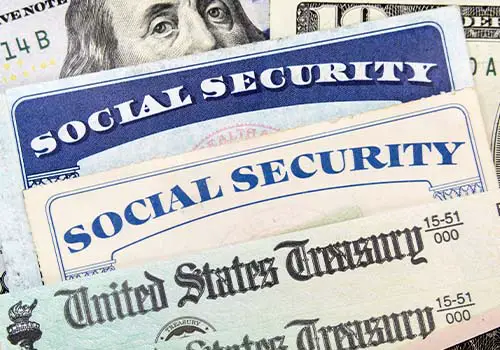If you receive Supplemental Security Income benefits from the Social Security Administration (SSA), you likely rely on those payments each month for essential household expenses. Since SSI benefits are only available to those with a financial need, the monthly payments are crucial to helping those individuals make ends meet. Believe it or not, you could receive a letter from the Social Security Administration alleging that they have overpaid your benefits.
If you receive such a letter, it generally states that you have 30 days to repay the excess amount. This could leave you confused, anxious, and worried, especially if you don’t have the money to repay them.
Thankfully, you have some options, and it is possible to win your overpayment case and not repay the money. Keep reading as we give you a complete guide on how to win your SSI overpayment case.
What Is An SSI Overpayment?
An SSI overpayment is exactly as it sounds. It occurs when the Social Security Administration pays you more SSI benefits than you were entitled to. Remember that SSI benefits are based on financial need, and you can receive partial SSI benefits if you have some income. The more income and resources you have, the lower your SSI payments will be.
An overpayment can occur for a few different reasons:
Failure To Notify SSA Of Your Income
The most common reason is that you failed to notify the Social Security Administration of your income. Perhaps you started a job but failed to notify the SSA of the income. Once you started paying Social Security taxes through your employer, they became aware of your job.
Upon finding out the details of your employment, they realized that they had been overpaying your SSI benefits for a few months.
In that case, you would likely get a letter in the mail demanding repayment of the excess benefits.
SSA Fails To Account For All Your Income
Another thing that can cause an overpayment is when Social Security fails to account for all your income when calculating your benefits.
Even though you may have notified them of your income, they performed the calculations incorrectly when determining how much your SSI check would be.
Although you provided the correct information, the SSA might still come back and demand that you repay the amount of the overpayment.
Changes In Household Size Or Living Situation
Overtime, you may experience a change in the number of people living with you in your household. You might also decide to move, which changes your rental situation.
Your SSI payment amount factors in your household size and current living situation when initially calculating your benefits. If these factors change, you need to notify the SSA office, as it may impact your SSI payment and potentially lead to an SSI overpayment.
* Notice of Overpayment
Whenever there is an overpayment situation, you should receive a Notice of Overpayment in the mail from the Social Security Administration.
This notice will outline the specifics of your case. It will give you the amount of the overpayment, and they will usually inform you that you have 30 days to repay the overpayment.
The Social Security office must inform you in writing before changing your monthly benefit amount or attempting to recover the overpayment using other methods, and this notice serves as their written notification.
KEY TAKEAWAYS
- The SSA must notify you in writing regarding any changes to your monthly SSI benefit or if they believe you have an SSI Overpayment.
- If it’s determined you owe the SSA for overpayments, you can setup a payment plan. This is typically a minimum $10 per month, with the whole amount needing to be paid within 3 years.
- You may qualify for an automatic approval of your waiver request, if the amount in question is less than $1,000, the overpayment was not the result of false statements to the SSA and you submit the waiver request within the required timeframe.
How To Handle A Social Security Overpayment
So, what should you do if you receive an overpayment letter? You have more than likely already spent the money on ordinary living expenses, so how does the Social Security Administration expect you to come up with enough money to repay them?
You have a few options when you receive an overpayment letter, and here are some things you can do.
Option 1: Repay The Overpayment
The most obvious thing that you can do after receiving one of these letters is to pay the overpayment back. You can send the Social Security Administration a check for the overpayment amount, and the whole situation will likely be put behind you. However, overpayments can sometimes be thousands of dollars. Unless you have a big tax refund check or similar payment on the way, you likely don’t have enough money to repay a large lump sum.
Since you probably can’t afford a large lump sum if you are living on a monthly SSI check, you can also work with the Social Security Administration to set up a payment plan. If you believe that you do owe the money back and can afford to pay it, this is likely your best option.
However, you should act quickly to set up a payment plan, otherwise, Social Security can withhold all of your benefits until the full amount is repaid. This could leave you in serious financial trouble.
Typically, the Social Security Administration requires that you repay at least $10 per month, and they want the full amount repaid within three years.
Option 2: Appeal The Overpayment Determination
You can appeal the decision if you don’t agree with the information in your Notice of Overpayment. You should know that you must file your appeal within 60 days of the date on your overpayment notice.
To avoid having the Social Security Administration withhold all your benefits (to cover the overpayment), you need to file your appeal within 30 days of the notice.
The appeals process for SSI Overpayment is similar to appealing an SSI denial notice.
– Request For Reconsideration
The first step in filing an appeal is a request for reconsideration. You must file your request in writing, and you can do this at your local Social Security office by completing the reconsideration form (SSA-561) or by making your request online.
During the reconsideration, an SSA worker will review your file and make a decision based on the paperwork in your file. You may also submit new documents to be included with your appeal request.
– Hearing By Administrative Law Judge
If your reconsideration request is unsuccessful, you can go to the next step in the appeals process. The next step is to request a hearing before an administrative law judge. You must request this hearing in writing within 60 days of receiving your reconsideration decision.
The administrative law judge will hear your case in person and make a ruling based on all the evidence in your file, plus any additional evidence that you might present at the hearing.
Most people choose to hire an attorney at this stage of the process, and you should contact the legal aid office in your area if you cannot afford an attorney.
– Appeals Council or Federal Court
If the judge rules against you, there might still be some options left. You could potentially take your appeal to the SSA Appeals Council or even a federal court. However, very few cases make it this far. We will discuss tips for winning your appeal later in this article.
Option 3: Request A Waiver
Your final option for handling the overpayment notice is to submit a request for waiver (Form SSA-632). A waiver request essentially means that you know you were overpaid, but you are requesting that the Social Security Administration forgive the debt. If the overpayment was not your fault and you cannot afford to repay it, the waiver request might be your best option.
In some cases, the Social Security Administration must automatically approve the waiver. Automatic approval only occurs when the amount in question is less than $1,000, the overpayment was not the result of a false statement to the SSA, and you submit the waiver request promptly. If these criteria are not met, you may still submit a request for a waiver of the overpayment, but it might not be approved.
You must fill out the form and send it to the Social Security Administration in order to ask for a waiver of overpayment recovery.
You should know that the waiver request is fairly lengthy and complex. You must provide detailed information about your financial situation, household situation, and benefit payments.
If your waiver request is denied, you can then enter the appeals process described in Option 2 above.
Must read articles related to SSI
- A complete guide on “How to Apply for SSI“.
- Get more details about “What is SSI?“.
- Helping a family member with a disability, learn “How to get paid to take care of a family member with a disability“.
- Find out how much money you can receive while on SSI.
- Understand the difference between SSI vs SSDI and if you qualify for either one.
Tips For Winning Your Overpayment Case
If you have received an overpayment letter and decide to appeal, you need to know how to win your case. Much like winning an SSI appeal, winning a case for overpayment of Social Security benefits starts with some research.
- Understand why the Social Security Administration believes you were overpaid. Read the overpayment letter carefully. This letter should explain the reason for the overpayment, but it is not always clear from the letter itself.
- Call the Social Security Administration or visit your local SSA office to have someone explain the overpayment issue in more detail. This might seem like a hassle, but putting in the work upfront will lead to a much better chance of success on appeal.
Once you understand what caused the potential overpayment, you will have a better idea of how to defend it.
- Draft your appeal letter. Make sure that the letter is written factually and objectively. Refer to any Social Security documentation that you have and make sure that you fully explain your position in the letter.
- If repaying the amount will create an undue financial hardship, then make sure you explain those details in your letter.
Some people choose to hire an attorney at this point in the process.
- In some cases, the Social Security Administration might request more information from you. If they do, make sure you provide it on time.
- If they disagree with your request and deny your appeal, you still have the option to request a hearing with a judge.
If you firmly believe that you are right, keep escalating the appeal to the next level until you either win or have no more options.
TIP
It will generally take about a month to get a response to your appeal, so be prepared to wait. To expedite the process, respond quickly to any notices you receive.
Next Steps: If Your Overpayment Appeal Is Unsuccessful

If you have exhausted all your appeal options, what can you do next? If you have not already submitted a request for waiver, then go ahead and try that.
In some cases, the Social Security Administration must automatically approve your waiver request. Even if the waiver is not automatically approved, it is still worth submitting and trying to get it approved.
Lastly, if everything else is unsuccessful, you must repay the money. Make sure that you contact the Social Security Administration to set up payment terms that you are comfortable with. They will usually accept a monthly repayment rate as low as $10.
Failure to contact them and establish a payment plan means that they will begin to withhold the back pay on their own terms. This could mean withholding all your benefits until the full amount is paid. You certainly want to avoid that situation, so make sure you contact them as soon as possible if you must establish a repayment plan.
The Bottom Line
Getting an SSI overpayment notice in the mail might seem overwhelming. But there are things you can do before you have to repay the full amount in the letter.
You can also appeal the overpayment determination, and you can request a waiver of the overpayment.
In either case, ensure that you fully understand why Social Security believes they have overpaid you. Use this information to draft your appeal letter, and make sure you state objective facts that support your case.
Consider hiring an attorney and know that you can take your case to the next level of appeal if your reconsideration request is unsuccessful.
Frequently Asked Questions
Yes, Social Security will settle an overpayment in some cases.
One key to getting an acceptable resolution to your overpayment case is communication. Talk to the Social Security Administration to see what they will do for you.
In most cases, you can at least set up a payment plan to repay the amount on your own terms. Often, they will also accept a lower amount, especially if you are willing to pay the lower amount in full immediately.
If you must repay the overpayment, then work with the Social Security Administration to find a compromise that works for you both.
You must file an appeal of the overpayment determination within 60 days of the overpayment notice.
The first step in the appeals process is to request a reconsideration.
You may request a hearing with an administrative law judge if that is unsuccessful.
You can still ask for a waiver of the overpayment after you have exhausted the appeals process. The waiver request is essentially asking the Social Security Administration to forgive the overpayment debt because it was not your fault.
The SSA can go back two years for any SSI overpayments.
If you received an overpayment more than two years ago, it is unlikely that they will request a repayment of that amount.
Only in cases of fraud would the SSA go back beyond two years for an SSI overpayment.
For Title II Social Security benefits, they can go back four years for an overpayment amount.
If you owe an overpayment to Social Security, you will receive an overpayment notice in the mail.
The notice will include the amount of the overpayment, and the notice should give you details about the reason that Social Security believes there was an overpayment.
You typically have 30 days to repay the amount, although you can request an appeal within 60 days.
If you wait more than 30 days to request the appeal, the Social Security Administration will automatically begin withholding benefits to recoup the amount of the overpayment.
Overpayment situations are not as common with Social Security disability benefits as they are with SSI benefits. However, they can still happen! If you receive SSDI benefits and get an overpayment letter in the mail, you should follow the same steps already outlined in this article. The process of handling an overpayment notice for SSDI benefits is the same as it would be for SSI benefits.
You can either repay the amount, request a waiver, or appeal the determination. If you agree with the overpayment decision and can afford to pay back the amount, this is likely the easiest thing to do.
However, you can also request a waiver of the overpayment or appeal the overpayment determination. To do this, you should follow the same steps outlined for SSI benefits’ waiver and appeal processes.
You can find a Social Security Administration office near you by using our SSA office locator and searching for your closest location.





